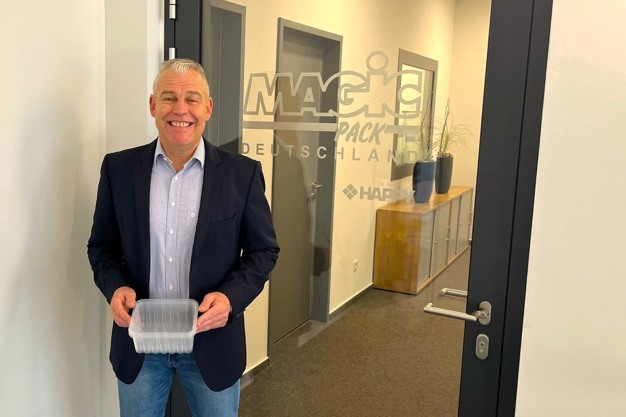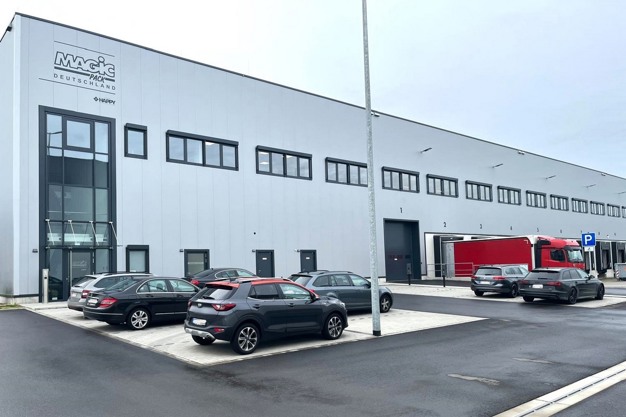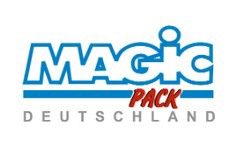After a good ten years in Grevenbroich, Magic Pack Deutschland GmbH moved into a brand new logistics center with around 6,000 m² of storage capacity and an office building above it in Nettetal-Kaldenkirchen on October 1, 2023. At the new location, the subsidiary of the Italian Gruppo Happy continues to sell food packaging of all kinds, including a wide variety of packaging materials for fruit and vegetables. Following the presentation at this year's BDC conference in Lohne, we spoke to Marco Conen, a long-standing sales manager at Magic Pack Deutschland GmbH, about the challenges surrounding the European Packaging Regulation (PPWR) coming on January 1, 2030.
Since its foundation in 2011, Magic Pack Deutschland GmbH has focused on establishing and expanding an international sales network for the areas of the Federal Republic of Germany, Benelux, Scandinavia, Austria, Switzerland and the Baltic States. In addition to a range of packaging products from its own production, the company also offers a variety of commercial packaging products such as PVC and PE stretch films, PET salad bowls and convenience packaging. Since 2017, the company has also been operating as a logistics service provider for the sales branch Magic Pack Luxemburg SARL. In 2020, the Italian company Ipack Srl. was also acquired, with 30 years of experience in the production of paper and cardboard trays. "With this acquisition, we are responding to the major global changes and future challenges in the packaging sector," says Conen.

Marco Conen, Sales Manager at MAGIC PACK Deutschland GmbH
Challenges in the fruit and vegetable packaging sector
Originally, Gruppo Happy was dedicated to the production and marketing of packaging, mainly foam trays, for the meat industry. In the field of vegetable packaging, the company's 1kg carrot trays in particular gained international attention. Ten years ago, Magic Pack Deutschland GmbH then initially specialized in the production and marketing of PP trays for mushrooms. Conen: "From this base, we then also developed foam and PP trays for mini cucumbers, a wide variety of berries and soup vegetables, which have been well received internationally. Nowadays, fruit and vegetable packaging accounts for around 60 percent of Magic Pack Germany's total sales, while meat packaging still accounts for up to 80 percent of the group's total sales."
The European Packaging and Packaging Waste Regulation (PPWR), which will come into force on January 1, 2030, is already hanging over the fruit and vegetable industry like the sword of Damocles, especially the cultivated mushroom sector. "The legislation basically stipulates that from 2030 everything should be packed in cardboard, but in practice this is simply not feasible. Firstly, I think it's impossible to transport the required volumes without plastic and get them on the shelves. Secondly, we must not ignore the hygiene factor: if we really do get rid of plastic packaging, we will inevitably see complaints and millions of euros' worth of food waste. We must not forget that entire industries and livelihoods are at stake here. I therefore expect that certain products, not only cultivated mushrooms but also grapes and soft fruit, will be exempt," the packaging expert continues.

The facade of the modern site in Nettal-Kaldenkirchen
RPP for food purposes
The well-thought-out increase in the production of recyclable polypropylene (RPP) offers a sustainable solution here. "Polypropylene can be recycled, but only for non-food packaging such as flower pots and the like. Our aim is to redirect these streams to the food industry again. We believe it would make sense to work with recycling companies to develop a solution in which the streams from the non-food and food industries can be separated so that both streams can be recycled separately. In view of the PPWR, this is particularly important not only for the fruit and vegetable industry, but also because PP is also being scrutinized in Germany and, in the worst case, is to be banned from 2030 if the respective packaging does not contain at least 10 percent recycled material. The issue therefore not only affects the manufacturers of fruit and vegetable packaging, but basically the entire packaging industry and its sales channels," concludes Conen.
Photo credit: MAGIC PACK Deutschland GmbH
For more information:
Marco Conen - Sales Manager
MAGIC PACK Germany GmbH
Bürdestraße 17
41334 Nettetal
Phone: 0 21 57-870 21 22
Fax: 0 21 57 -870 21 29
[email protected]
https://gruppo-happy.it/de
